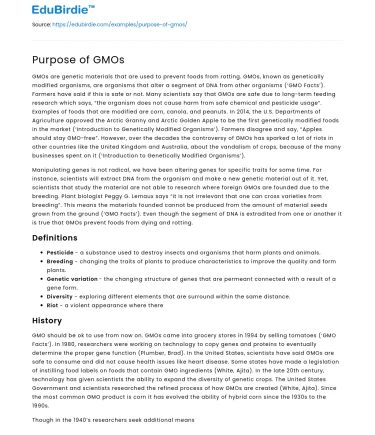Introduction
Genetically modified organisms (GMOs) have emerged as a pivotal innovation in modern agriculture, aiming to address global challenges such as food security, environmental sustainability, and economic development. The purpose of GMOs extends beyond mere productivity enhancements; they serve as a tool for developing crops with improved resistance to pests, diseases, and adverse climatic conditions. According to the Food and Agriculture Organization (FAO), the world population is projected to reach approximately 9.7 billion by 2050, necessitating a significant increase in food production (FAO, 2019). GMOs offer a potential solution by improving crop yield and nutritional quality. Despite their potential benefits, the use of GMOs is often met with controversy, raising questions about their safety, ethical implications, and long-term impact on biodiversity. This essay explores the multifaceted purpose of GMOs, evaluates their benefits and challenges, and addresses the counterarguments to provide a comprehensive understanding of their role in modern agriculture.
Enhancing Crop Yield and Nutritional Quality
One of the primary purposes of GMOs is to enhance crop yield and improve nutritional quality, thereby addressing the issue of food scarcity. By introducing specific genetic modifications, scientists have developed crops that can withstand harsh environmental conditions, such as drought and salinity. For example, genetically engineered rice varieties, such as drought-tolerant rice, have shown increased resilience against water scarcity, resulting in higher yields (Zhang et al., 2018). Furthermore, GMOs have been instrumental in biofortification—enhancing the nutritional profile of crops. Golden Rice, engineered to produce beta-carotene, is a prominent example aimed at combating vitamin A deficiency, a major cause of blindness and mortality in developing countries (Beyer et al., 2002).
Save your time!
We can take care of your essay
- Proper editing and formatting
- Free revision, title page, and bibliography
- Flexible prices and money-back guarantee
Genetic modifications also offer solutions to pest and disease challenges that can devastate crops. For instance, Bt cotton, which incorporates a gene from the bacterium Bacillus thuringiensis, provides resistance to bollworm infestations, significantly reducing the need for chemical pesticides and increasing cotton yields (James, 2016). These advancements not only contribute to food security but also support sustainable agricultural practices by minimizing the environmental impact of conventional farming methods. However, the adoption of GMOs must be carefully managed to ensure that they do not inadvertently contribute to monoculture practices, which could threaten crop diversity.
Environmental Sustainability and Economic Impact
Another significant aspect of GMOs is their contribution to environmental sustainability and economic development. GMOs can reduce the environmental footprint of agriculture by decreasing the need for chemical inputs such as pesticides and fertilizers. For example, herbicide-tolerant crops allow for more effective weed management with fewer herbicide applications, leading to reduced soil erosion and conservation of biodiversity (Brookes & Barfoot, 2018). Additionally, GMOs can facilitate conservation tillage practices, which help maintain soil health and reduce greenhouse gas emissions.
The economic impact of GMOs extends to both developed and developing countries. In the United States, the adoption of GM crops has resulted in a significant increase in farm income, with a reported $20 billion gain from 1996 to 2015 (Brookes & Barfoot, 2016). In developing nations, GMOs have empowered smallholder farmers by improving crop resilience and reducing reliance on expensive agricultural inputs. For instance, the adoption of Bt cotton in India has led to increased yields and higher incomes for farmers (Qaim & Kouser, 2013). Despite these benefits, concerns about intellectual property rights and the consolidation of seed markets by major biotech companies remain pertinent issues that need to be addressed to ensure equitable access to GMO technology.
Addressing Safety Concerns and Ethical Considerations
The safety and ethical considerations surrounding GMOs present a significant counterpoint to their widespread adoption. Critics argue that GMOs may pose health risks due to the introduction of novel genes, with potential allergenicity and unintended effects being primary concerns. However, rigorous safety assessments conducted by regulatory bodies such as the World Health Organization (WHO) and the European Food Safety Authority (EFSA) have consistently found GMOs to be safe for human consumption (WHO, 2014). Despite scientific consensus, public skepticism persists, fueled by misinformation and lack of transparency in GMO production processes.
Ethical considerations also play a crucial role in the debate over GMOs. The manipulation of genetic material raises questions about the moral implications of altering natural organisms. Furthermore, the dominance of large biotech corporations in the GMO market has sparked concerns about corporate control over the global food supply. To address these issues, it is essential to foster public dialogue, enhance transparency in GMO research, and develop policies that ensure equitable distribution and access to GMO technology.
Conclusion
In conclusion, GMOs serve a multifaceted purpose in modern agriculture, encompassing the enhancement of crop yield and nutritional quality, promotion of environmental sustainability, and support for economic development. While the benefits of GMOs are substantial, the challenges and counterarguments surrounding their safety, ethical implications, and market dynamics cannot be overlooked. A balanced approach that considers both the scientific evidence and societal concerns is essential for the responsible integration of GMOs into global agricultural practices. By addressing these challenges and fostering informed public discourse, we can harness the potential of GMOs to meet the growing global demand for food while ensuring environmental and economic sustainability.






 Stuck on your essay?
Stuck on your essay?

